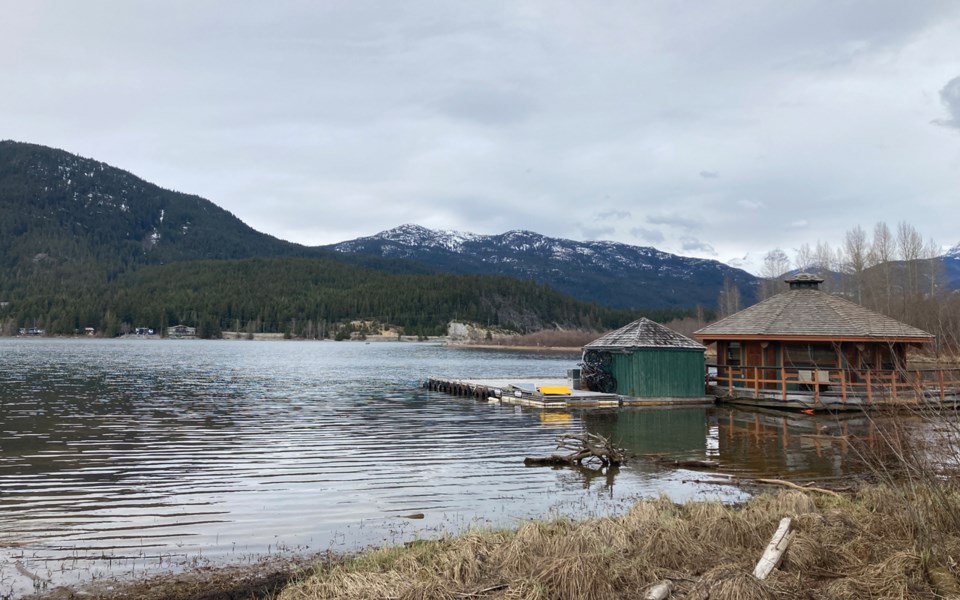As Whistler’s lakes continue to grow in popularity, the Resort Municipality of Whistler (RMOW) is advancing a plan to better manage them.
At its May 10 meeting, mayor and council heard a report on lakes management that outlined some tools Whistler could use to create a new regulatory framework.
But given the number of legislative powers at play, lake management is not a straightforward process.
Though the provincial government owns nearly all freshwater and saltwater foreshore (Crown land between the high and low watermarks of streams, rivers, lakes and the ocean), land adjacent to the foreshore can be privately owned.
Building and locating docks or private moorage facilities on Crown land requires authorization from the province—but buoys and vessels (which includes barges with motors 10hp or over) are governed by federal regulations.
With all of that in mind, lake management has been a tough nut to crack for the RMOW in recent years, but the May 10 report touched on some areas the local government can influence.
“Last year, we put out a request for proposals for getting a Lakes Management Options Report (LMOR) completed. The main purpose of that was to scan what other municipalities were doing, looking at the pros and cons of all the different ways that they were trying to manage lakes, and make some recommendations for us,” said environmental stewardship manager Heather Beresford in a presentation to council.
Keeping the multi-jurisdictional nature of local lakes front of mind, management options in the LMOR were laid out on a priority scale—with the simplest-to-implement policies recommended for testing first, and if those don’t accomplish the municipality’s objectives, to move to more complicated inter-jurisdictional policies.
One option laid out in the report recommends installing gates at Alta and Green Lakes that would be locked in the evening, which would limit boaters to day-use only, and adding pay parking to the parking lots at both lakes to prevent long-term parking. This option could be implemented right away since the RMOW already has jurisdiction over land access points.
If locally initiated policies don’t have the desired effect, more complicated zoning and permitting could be adopted.
To that end, the LMOR recommends creating water zones, which would classify what activities would be allowed at each lake; creating lake-specific development permit areas, which would require environmental assessments to go forward; and pursuing applications to Transport Canada under the Vessel Operation Restriction Regulations to restrict certain vessels from operating on a lake. This could include banning gas motors on lakes—a measure the RMOW pursued for Alta Lake in 2021, but which was ultimately rejected by the federal government.
The final tool in the toolbox is applying for a Crown Head lease, which would be helpful for the municipality if it wants exclusive authority over an area where it wants to stop any and all development or access.
There’s also the ongoing issue of illegal docks, party boats and barges on Whistler lakes, which have continued to proliferate even as the RMOW works to remove them.
“Over the last few years, we’ve been getting more and more letters and comments from the public about the proliferation of docks and party barges on the lake,” Beresford said.
“Just general concern with the aesthetics, the environmental, the experiential effects on the lakes and wondering where this goes and asking the municipality to take more action on it.”
Cleaning up the shoreline of these unauthorized and derelict docks is a priority for the municipality as the busy summer season fast approaches.
“We’ve been looking to remove derelict docks and barges that accumulate on the lake and the foreshore, which is quite an onerous task,” said resort operations manager Derek Jazic.
“It’s costly. It’s very labour intensive. It involves environmental considerations, as construction of barges don’t always meet proper environment input for dealing with waterlogged styrofoam, tires, old oil cans, etc.”
A municipal spokesperson said in an email that the foreshore licences will allow existing RMOW bylaws to “extend beyond our parks and over the water into and covering the area of the license. This will allow for discouragement and management of buoys, rogue or derelict docks and other possible nuisance or environmentally damaging infrastructure within an RMOW foreshore license tenure.”
Coming up this summer and over the next year, the province will be taking a staged approach to getting residents to dismantle or legalize their docks. It will start with the province delivering letters to dock owners advising them that they are non-compliant. Owners will then have a chance to decommission their docks or attempt to legitimize them within a deadline period.
“If action is not taken by 2023, in their words, they will take action on the most egregious non-compliant docks and non-moored structures,” Beresford said.
Find more info at whistler.ca/docks.




